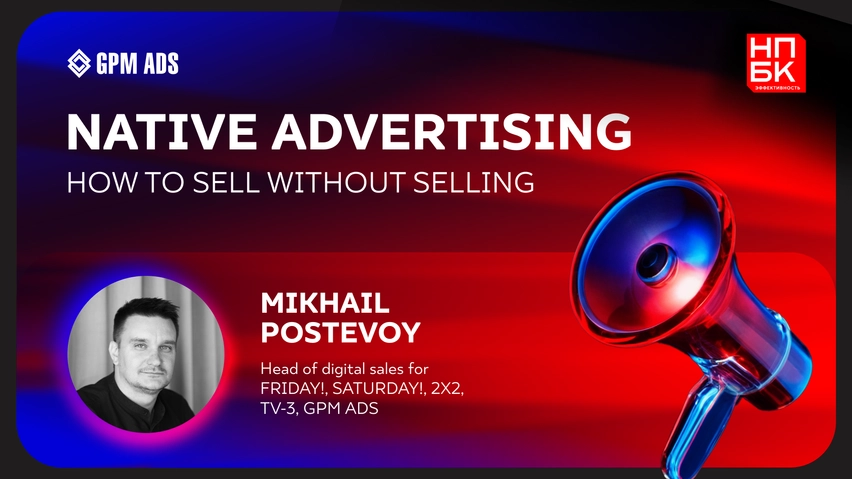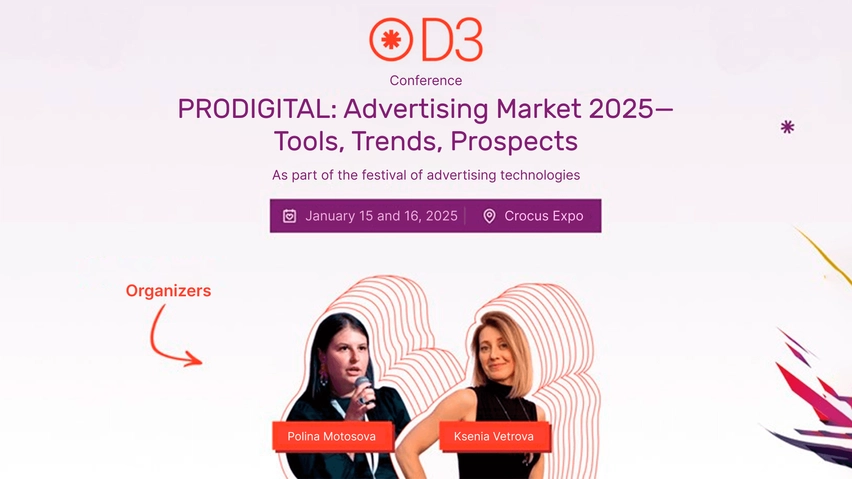
Experts discussed the role of the media industry in SME development at SPIEF 2023 pitch session
The session was attended by the representatives of key entities that implement support programs for small and medium-sized enterprises, as well as by CEO’s of media companies and members of the business community. The experts cited relevant market figures, outlined growth points, and discussed advertising tools for SMEs. The session was initiated by Gazprom-Media Sales House that will launch an educational project for entrepreneurs in 2023 in cooperation with RACA and SME Corporation.
The 26th St. Petersburg International Economic Forum (SPIEF) was held on June 14–17. This year’s highlight was the Day of International SME Cooperation—a new SPIEF participation format for small and medium-sized entrepreneurship. The announced anchor event of the day was the SME Forum, which featured more than 20 sections to discuss various challenges and issues.
The pitch session titled “The Role of the Media Industry in Supporting and Developing the SME Segment in Russia” was focused on improving the marketing experience of representatives of small and medium-sized businesses. The session was attended by various entities, including non-commercial organizations (SME Corporation, National Priorities, RACA, Non-Profit Partnership “OPORA”), media companies (Gazprom-Media Sales House, Russian Media Group, VOSTOK-MEDIA, Media Press), as well as Starlink, NSPK, Biofarmrus, Istra Cheese Factory.
Experts on the panel discussed the current national SME development strategy, including support measures, opportunities for promoting SMEs on TV, radio and digital platforms, consumer expectations regarding domestic products, and success stories of various entrepreneurs.
The session moderator Alina Efimova, Deputy CEO of Sales and Business Development at Gazprom-Media Sales House, noted that in today’s Russia more than 6 million micro, small, and medium-sized businesses provide employment for more than 15 million people. According to international student entrepreneurship monitoring, 42% of Russian students are seriously considering starting their own business.
Aleksandr Isaevich, CEO and Chairman of the Board at SME Corporation, highlighted the positive trend of SME growth in the GDP in the financial and oil & gas sectors. He also emphasized the importance of effectively informing entrepreneurs about support measures, eliminating barriers in transitioning businesses between categories, and providing SMEs with the necessary tools for development.
I don’t shy away from saying that SME Corporation is a tool, with entrepreneurs on one side, and the Government on the other side. All of us speak about support. Huge thanks to the media, which have started to pay, and for a long while have been paying attention to entrepreneurship, its popularization, and its image. As for our company, we have learned to work with 78 banks. And we have learned to work with 89 regions. Well, let’s think it over together and set the framework for delivering relevant tools to entrepreneurs through accelerators, through filters that we will make open and transparent.
Grigory Novikov, Director for Development at ANO National Priorities, explained how My Business centers help minimize the level of mistrust in support measures among entrepreneurs, and what stands in the way of SMEs increasing their investment in high-reach media.
Small and medium-sized enterprises are eager to find solutions that deliver quick results. They are reluctant to switch to traditional media, which multiply the visibility of the business, and which yield results in terms of reach. This is something unfamiliar to them, and they must be encouraged to do it. This is exactly what Gazprom-Media does with the use of reach tools and sponsorship. The existing media environment we are talking about is fully oriented towards providing and finding ways to finance small and medium-sized entrepreneurship.
Natalia Peisakhovich, Director of MIR Card Marketing and Communications Department at AO NSPK, presented NSPK’s projects for SME support and stressed the importance of both implementation and promotion of special programs.
We have developed a dashboard on our loyalty platform, where small and medium businesses can run their own campaigns based on big transactional data. The analytics available there are presented in various contexts, including region, gender, age, and, of course, how and where people spend their money. Right now, our mission is to promote and popularize small and medium-sized businesses as much as possible to help them. The second project, and a smaller task, is the Faster Payments System. We also actively promote this tool for small and medium-sized businesses. It has the dual advantage of a low acquisition fee and no equipment costs.
Valentin Smolyakov, Executive Director of the Russian Association of Communication Agencies (RACA), outlined the dynamics of the advertising market: a 2% overall drop by the end of 2022, a significant increase in outdoor advertising, and more than 1,000 new advertisers on TV. The expert also described the challenges faced by platforms, SMEs and brands.
Currently, small and medium-sized businesses account for 95% of the advertising market. Moreover, even the largest companies that have existed and continue to exist in Russia now belong to Russian entrepreneurs as well. My guess is that this new paradigm will be our driving force. We keep saying that our entrepreneurs lack sufficient knowledge about marketing and running a business. However, I can say that even seasoned marketing experts do not always have sufficient knowledge when it comes to designing and launching new brands. This is because we would often operate in a market where Western headquarters would communicate brands, strategies, and practices. Everything would be adapted and refined. But, frankly speaking, neither we nor our Western counterparts are used to building brands from the ground up. This is because in the West they have long since passed through all the stages of brand establishment. And now we have to reinvent everything from scratch. It is very important to share knowledge and experience, and to present our best cases to the audience.
The key part of the pitch session was a discussion of an effective media mix for SMEs. Alina Efimova, who moderated the section, said that the share of SMEs in the federal advertising campaigns on TV is minimal—2–4%. Nevertheless, new players in this category continue to emerge. A positive trend can be seen in regional television advertising. In large cities with more than one million residents, the share of SMEs (in terms of GRP) rose from 20 to 30%.

What’s even more interesting is that radio now earns a quarter of its income from medium and small businesses. This tool is quite affordable and convenient for the advertiser and in some ways much more intuitive than CPP- or CPM-based purchases. The price lists are clear and understandable, the payback through sales and release to the air are reasonably fast.
The statistics of the share of SMEs in radio advertising were also shared by {3]{3][1}[6}Dmitry Mednikov, Managing Director at Russian Media Group. According to the expert, there are about 1,000 small and medium-sized business entities among the advertisers of the Holding, and their number is gradually growing.
Radio advertising and regional television advertising are the most effective tools in terms of a company’s right to its own brand, adding that in order to grow, one needs to go through a series of iterations. Obviously, branding is necessary to become a large or at least medium-sized business. No amount of good performance can turn a company into an actual asset. This can be said with all due respect to targeting and its effectiveness.
Andrey Shitov, Shareholder and Chief Commercial Officer at Starlink, contributed to the discussion with his examples of implemented brand projects and suggested that the choice of advertising tools depends on the company‘s strategy and its goals.
The key to success is that you need to have a clear understanding of what you want in order to make an informed decision. Do you want to promote instant sales and get your products off the shelves today? There are tools like performance, campaigns, bloggers, BTL, shelf price—all these challenges can be solved. Or, perhaps, you want to build a corporation 5–7 years later? At the time when some Western corporations with huge budgets were flooding our media with television, radio, and outdoor advertising, an average entrepreneur or any other advertiser could not break through all that advertising noise. Now is the time when sales houses support Russian companies, realizing that this is the future.
Business representatives spoke about their attitudes toward advertising tools and placement in high-reach media from an entrepreneurial perspective. Sergey Zelenkin, co-venturer and co-founder of ZELDIS, co-owner of the Librederm brand, shared the story of launching an advertising campaign for the Horse Force brand at the stage of market entry. At that time, integration into the “Dom-2” TNT show became the starting point for building the brand awareness.
We didn’t have the idea of building a factory, and we had no idea whether the whole thing would even take off. In theory, it’s very easy to build a factory in Russia. It’s all about the hardware and the people. However, we started with building a strong brand. So we ended up spending $100,000 on brand building. It took us two months and eight broadcasts. And by the third month, our monthly sales reached 100,000 packages.
Alina Efimova, the moderator, added that Gazprom-Media is currently implementing the following projects in support of SMEs: “Now I’m the Boss” at Friday in cooperation with Sber, “Challenge” on TNT, and “Man of Business” on Autoradio.
The discussion also touched on the topic of educational practices for SMEs. Alexey Blinov, CEO of Media Press, spoke about the Advertiser School for SMEs in St. Petersburg.
It is well within our power to share our advertising experience and skills, and to provide insights into more convenient and effective practices in this line of business. That is why we have established the Advertiser School for small and medium businesses here in St. Petersburg. We invite everyone to learn together with us. We invite industry experts to tell us about working more effectively with the radio. Notably, our curriculum is designed in such a way that it’s 50% theory and 50% practice. In this way, our students can practice and learn how to present themselves and behave in front of a microphone, what to speak about, and what products they could launch.

In 2023, a new training course will also become available to small and medium-sized enterprises on the Digital SME.RF Platform, in the Business Education section. This project will be implemented by Gazprom-Media Sales House, RACA, and SME Corporation. The course curriculum will include media planning essentials, brand building, and content creation. The project will bring together agency professionals, lawyers, business analysts, and practicing entrepreneurs. The knowledge obtained by Russian companies will help them define the most effective advertising solutions to scale up their operations.
Do you want to advertise?
Send us a message right now, and our managers will get back to you right away!
What type of advertising are you after?








.png?quality=100&width=852&format=webp)

 (1).jpg?quality=100&width=852&format=webp)

